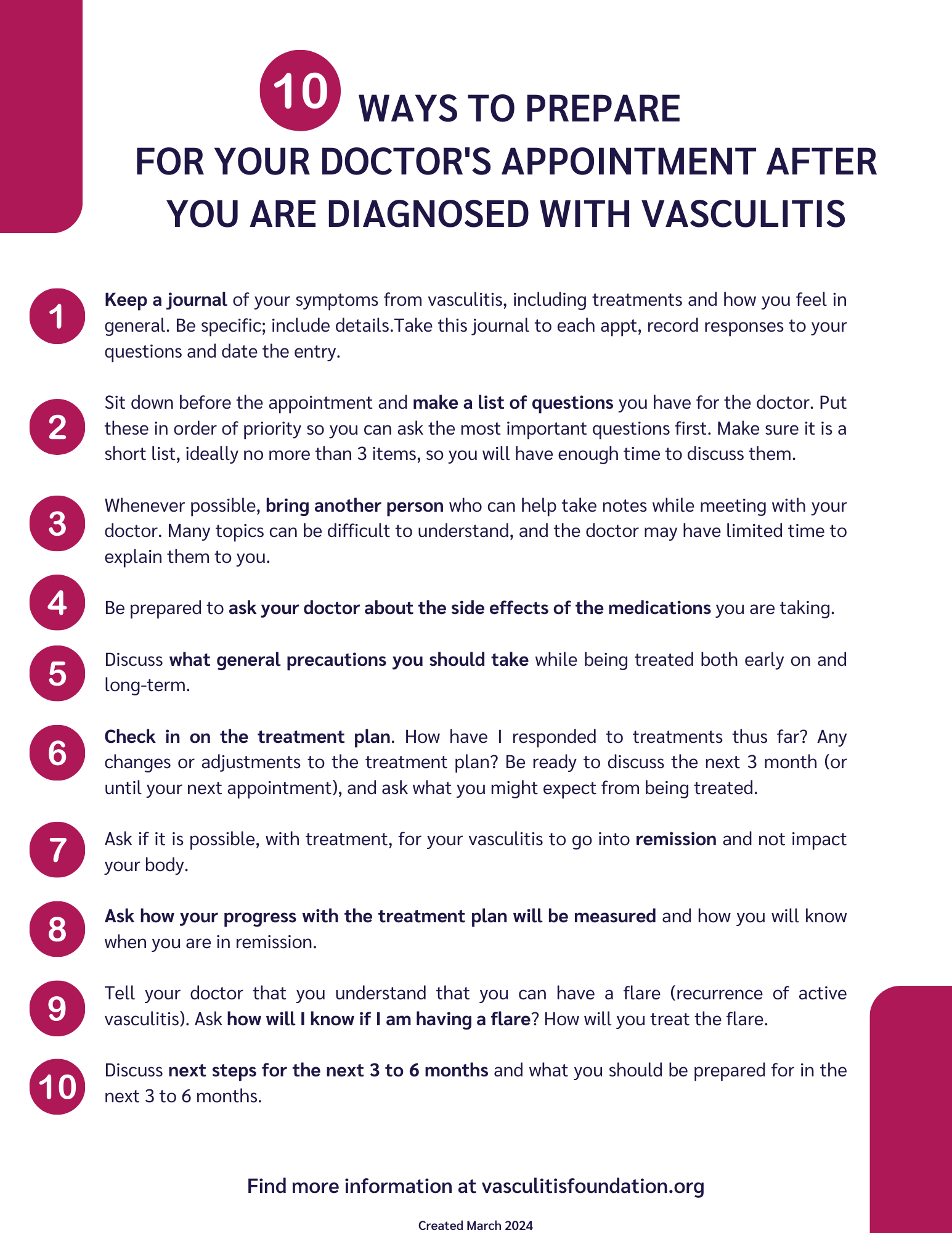Self Advocacy
Advocating for Yourself
What does effective medical self-advocacy look like? It’s going to a medical appointment with questions at the ready. It’s educating yourself about the latest vasculitis research advances and clinical studies. It’s listening to yourself about how your journey with vasculitis is going and what you want your future as someone living with vasculitis to be.
How To Advocate For Yourself With Your Healthcare Provider
You’ve Got 15 Minutes - Make It Count
Preparing for a visit with your healthcare provider? Make sure you have these ready to go:
- List of current medications, refill requests, lab tests you need to schedule/discuss.
- Your main goals for the appointment (no more than three).
- A summary of how you are doing (be brief and HONEST).
- Any problems (side effects, insurance, expenses, ANYTHING stopping you from carrying out the treatment plan).
- List of any questions you have that only the doctor can answer.
Some Possible Questions:
- Why are you recommending this test/treatment?
- Why do you think this treatment will work for me?
- How will we know if the treatment is working?
- What are the other options?
- Ask yourself, is this the right doctor for answering my question?
Before you leave, make sure you:
- Schedule your next appointment.
- Know your homework (bloodwork, tests, referrals).

Vasculitis Medications: What Your Pharmacist Wants You To Know
Medication Questions for your Doctor: Why?
Medication Questions for your Doctor: How will I know if it's working?
Medication Questions for your Doctor: What are the side effects?
What Your Pharmacist Wishes You Knew
Medication Tips from a Pharmacist
Controlling Medication Costs
Medication Questions for your Doctor: Timing of Medications and Vaccines
Be prepared when the doctor prescribes a new medication. Ask questions when you are in the doctor’s office.
WHY are you prescribing this medication for me?
WHAT should I expect this medication to do for me?
- Control/resolve vasculitis symptoms? (Treat active disease? Maintain remission? Treat a flare?)
- Control/resolve side effects? (Sleep issues, GI issues, high/low blood pressure, peripheral neuropathy, etc.
- How can I tell if what I am feeling is a side effect of the medication or a symptom of the Vasculitis?
WHAT’S NEXT?
- How long will I have to take this medication?
- How long will it take for the medication to start working?
- How long do we wait to determine if the medication is not working? What then?
- Who do I contact if I think I am having a problem – filling the medication, getting insurance approval, having a side effect?
WHEN should I take this medication?
- Morning/afternoon/evening
- With food? On an empty stomach?
- With other meds? By itself?
- Are there any food, drink, or drug interactions I should consider, most commonly with statins, citrus, or foods with high calcium content (dairy products)?
HOW is this medication given? Ask about other options.
- Pill – can you swallow big pills? Can it be split?
- Injection – needle phobia? Will someone teach me how to inject myself?
- Infusion – outpatient infusion centers or hospital?
Ask about the TIMING of medications and vaccines such as flu, pneumonia, shingles, and COVID-19.
- Ask how much the medication costs, if insurance covers the medication, if it requires pre-approval, is there a generic available? The doctor may not know the answers but can direct you to someone in their office who can help. You may need to call your insurance company directly to ask questions.
- If you are in the hospital all medications will be dispensed by the hospital pharmacy.
- Pharmaceutical companies may have patient-assistance programs although it can take time to process an application and eligibility differs based on each company.
KEEP A LIST of your medications, doses, and schedules so you can track how long you have been on a medication.
KEEP TRACK of anything unusual that happens. These could be side effects.
- What did you notice and when did it start?
- How often is it happening?
- Is it better or worse at a particular time of the day?
- Take pictures of any visible signs (rashes, swelling, etc.)
- Contact the doctor’s office if necessary and be prepared to provide a clear description of what you have observed.
Always contact your doctor right away if:
- You think you are having side effects
- You are unable to take your medication for ANY REASON (side effects, cost, insurance issues, prescription approval, medication shortage, etc.)
- Your vasculitis symptoms are not getting better or are getting worse
Ask questions when you pick up your medicines. Pharmacists are happy to answer your questions. If possible, work with one pharmacy. All pharmacies have drug interaction software to ensure that patients aren’t prescribed two medicines that might interact with each other.
Our Self-Advocacy Experiences




Self-Advocacy Resources
Tips from Emma
- My rheumatologist has always been supportive of my curiosity and my research; however, he did encourage me to take caution with what I was reading and to raise any questions with him so that he could provide medical feedback based on my condition.
- Ahead of every appointment, I make a list of the issues and observations since my last visit, as well as any requests such as specific blood tests I would like done or review of my medications.
- I keep a folder of photos on my phone of any physical items that seem unusual, which I go through with my rheumatologist.
Websites & Articles
- How To Advocate For Yourself At The Doctor’s Office
- Tips To Help You Advocate For Your Health
- Self-Advocacy At Doctor Appointments
- Patients Rising Provides education, resources, and advocacy for people living with chronic illness
Medication Cost Help
- Charitable Organizations
- The National Organization for Rarde Disorders NORD offers resources that can help with medication costs.
- Ask your doctor or pharmacist about prescription cost assistance programs from the medication’s manufacturer or do an online search for the manufacturers contact information/website.
- If you are prescribed a new medication while hospitalized, ask to speak to the on-staff social worker or patient advocate before leaving the hospital. They can help you access programs that can help with the cost of medications


